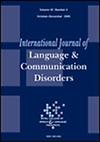A study on the reliability and validity of the Japanese version of the Scenario Test for people with chronic stroke-induced aphasia: A cross-sectional study
Abstract
Background
The Scenario Test is recognised for its effectiveness in assessing the interactive aspects of functional communication in people with post-stroke aphasia (PWA).
Aims
To develop a Japanese version of the Scenario Test (Scenario Test-JP) and assess its reliability and validity.
Methods & Procedures
Among 66 participants, we selected 61 individuals: 34 PWA and 27 healthy controls (HCs). We modified the Scenario Test-JP based on the UK version and subsequently evaluated its reliability (internal consistency, test–retest and intra-rater and inter-rater reliabilities) and validity (convergent and discriminant) by comparing PWA and HCs.
Outcomes & Results
The Scenario Test-JP showed strong reliability with a Cronbach's α of 0.93, test–retest reliability with an intraclass correlation coefficient (ICC) of 0.97, intra-rater reliability with an ICC of 0.95–1.00, and inter-rater reliability with an ICC of 0.96. The validity of the test was confirmed with concurrent scores ranging from ρ = 0.37 to 0.76 (p < 0.05) and known-groups validity (p < 0.001, r = −0.56).
Conclusions & Implications
The reliability and validity of the Scenario Test-JP align with those of the original Dutch version and the UK and Greek versions. Additionally, the assessment can now include extended alternative communication methods, such as digital devices, indicating the potential of the Scenario Test-JP for modern Japanese speech-language therapy.
WHAT THIS PAPER ADDS
What is already known on the subject
-
Interactive communication is a facet of functional communication and is crucial for evaluating engagement and participation of people with aphasia (PWA) in speech-language therapy. The Scenario Test provides valuable information for planning speech-language treatment strategies by assessing dialogic communication.
What this study adds
-
This study describes the development of the Scenario Test-JP for use with Japanese speakers and Japanese PWA, which is adapted from the Scenario Test UK version. This study evaluated the reliability and validity of this assessment tool and provided supporting evidence.
What are the clinical implications of this work?
-
The reliability and validity of the Scenario Test-JP were consistent with those of the Dutch, UK and Greek versions. The Scenario Test-JP contributes to speech-language therapy in Japan, where high-quality support for the activities and participation of PWA is required.
PRACTITIONER POINTS
Insights from the Scenario Test
The Scenario Test plays a crucial role in evaluating the functional communication skills of people with post-stroke aphasia (PWA). Enhancing functional communication has been linked to improved social engagement among PWA, which in turn influences their overall quality of life (QOL).
Issues addressed by the Scenario Test
The Scenario Test aids in delineating rehabilitation objectives for activities and participation among PWA, particularly concerning functional communication. The test facilitates tailored support for PWAs’ interactive communication and forms the foundation for appropriate speech-language therapy interventions.
Transformation of speech-language therapy (SLT) in Japan through the introduction of the Scenario Test-JP
The integration of the Scenario Test-JP could enhance the SLT services provided to PWA in Japan. With Japan experiencing an unprecedented ageing population, the prevalence of social isolation and diminished QOL resulting from communication disorders like stroke-induced aphasia is expected to rise. Consequently, the SLT rehabilitation sector in Japan is actively seeking effective interventions to support functional communication among PWA. Hence, the adoption of the Scenario Test-JP is anticipated to streamline the evaluation of functional communication, facilitating the judicious selection and timely provision of assistance to PWA in SLT, including guidance on communication partner support and communication skill training.

 求助内容:
求助内容: 应助结果提醒方式:
应助结果提醒方式:


